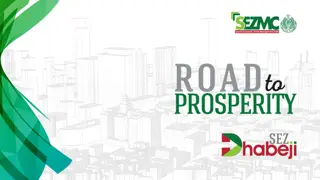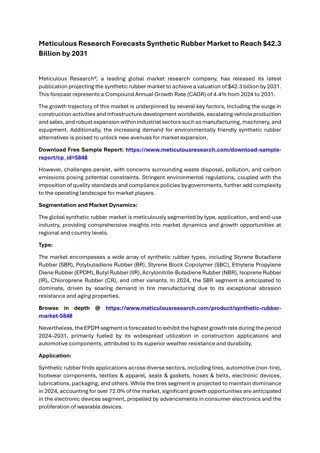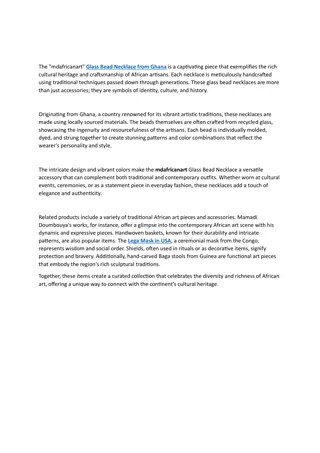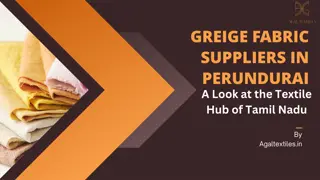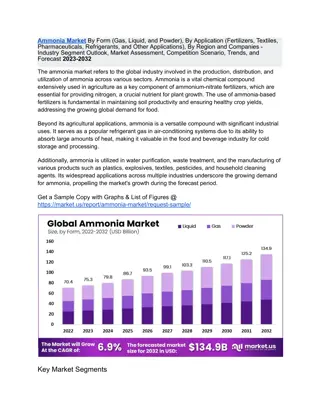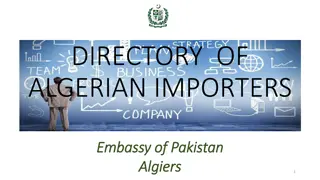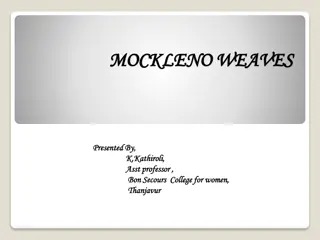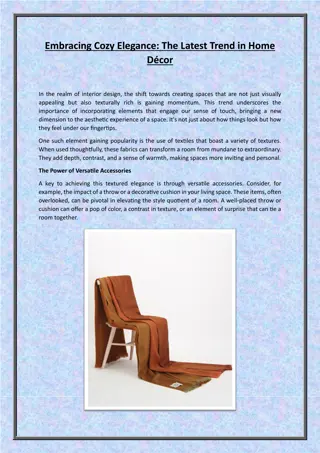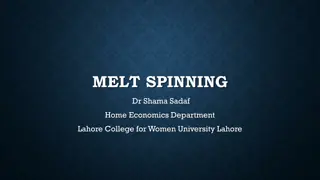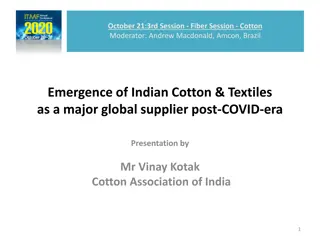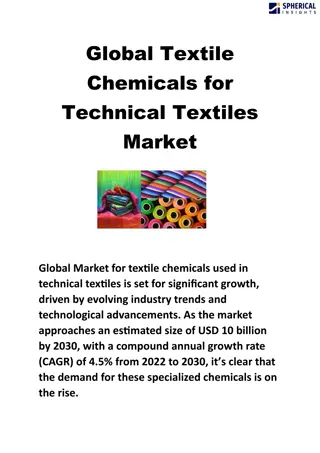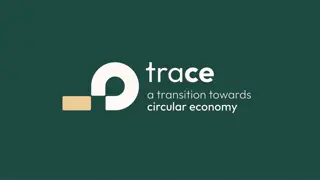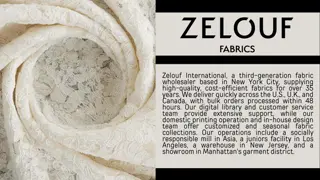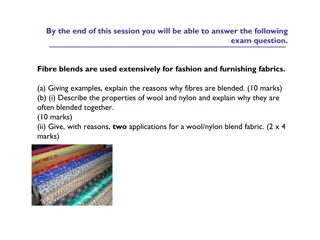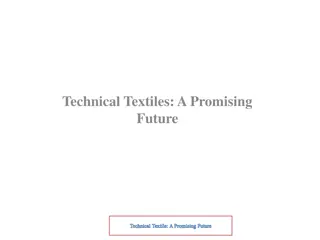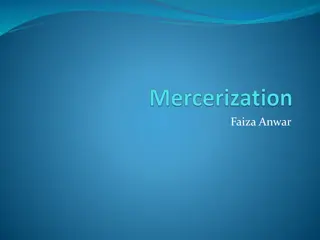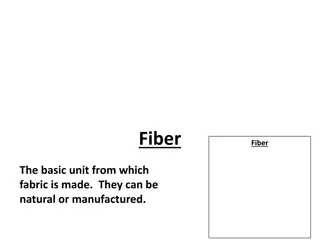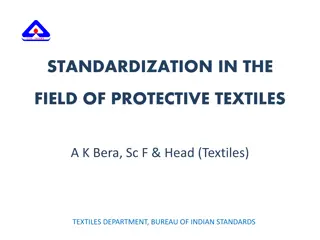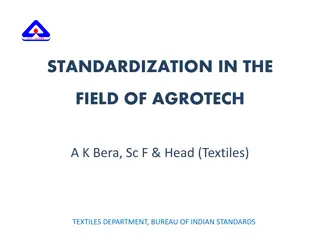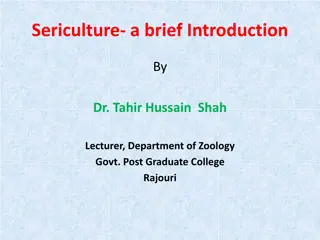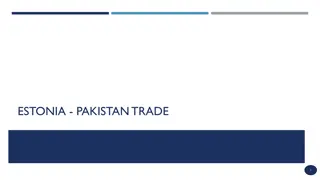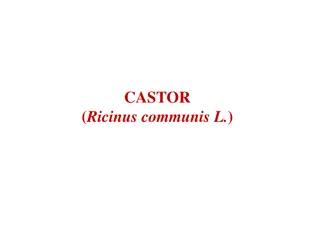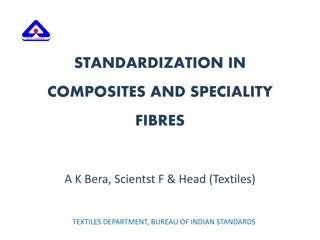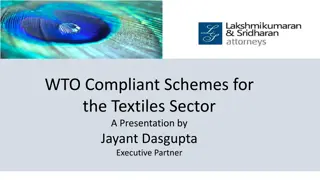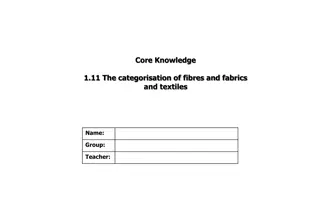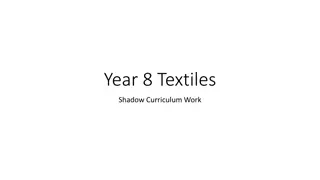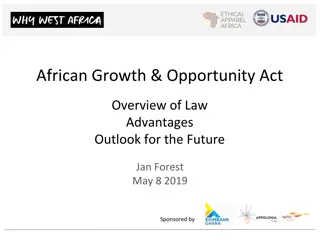Sustainable Fashion Solutions for Repurposing Formal Wear
Transforming formal wear from single-use items into sustainable fashion solutions is vital for reducing textile waste and environmental impact. This article explores the challenges of post-party formal dresses, the environmental consequences of textile waste, and innovative approaches to upcycling d
9 views • 14 slides
Dhabeji SEZ Connectivity: Enhancing Trade and Investment Opportunities
Dhabeji SEZ provides strategic connectivity for importing raw materials and exporting finished goods efficiently, with proximity to Port Qasim and Karachi Airport. Key enablers include awarded SEZ status, water and gas connections, road developments, and electricity provisions. The SEZ offers incent
0 views • 17 slides
Functional Textiles Market Analytics | By Growth Market Reports
The Global Functional Textile Market size was valued at USD 140.12 Billion in 2022 and is projected to reach USD 273.18 Billion by 2031, expanding at a CAGR of 7.7% during the forecast period 2023 - 2031.
4 views • 5 slides
Meticulous Research Forecasts Synthetic Rubber Market to Reach $42.3 Billion by 2031
Synthetic Rubber Market Size, Share, Forecast, & Trends Analysis by Type (SBR, EPDM, BR, SBC, IIR, NBR, IR, CR), Application (Tires, Textiles & Apparel, Electronic, Packaging), Industry (Construction, Automotive, Industrial) - Global Forecast to 2031
0 views • 2 slides
Glass Bead Necklace from Ghana
This ceremonial beaded bracelet from South Africa is a vibrant example of African artistry and cultural expression. Crafted meticulously by skilled artisans, the bracelet features intricate patterns using colorful glass beads, reflecting the traditional Zulu or Ndebele beadwork styles. Beadwork in S
2 views • 1 slides
Top Greige Fabric Suppliers in Perundurai: Quality and Affordable Options – agal
Are you in search of high-quality greige fabric at competitive prices? Look no further than Agal Textiles, your premier greige fabric supplier in Perundurai. We specialize in providing a wide range of greige fabrics that cater to diverse industry needs. Our commitment to quality ensures that you rec
0 views • 7 slides
Investments in Ammonia Infrastructure Set to Boost Market Growth
Ammonia Market By Form (Gas, Liquid, and Powder), By Application (Fertilizers, Textiles, Pharmaceuticals, Refrigerants, and Other Applications), By Region and Companies - Industry Segment Outlook, Market Assessment, Competition Scenario, Trends, and
1 views • 3 slides
Directory of Algerian Importers - Contact Information and Activities
Explore a comprehensive directory of Algerian importers showcasing a variety of products such as textiles, carpets, leather, rice, fruits, sports wear, spices, pharmaceuticals, and surgical equipment. Contact details and activities of various importers in Algeria provided.
1 views • 29 slides
A Level Textiles FAQs Answered: Studio Access, Course Requirements, University Pathways
Gain insights into utilizing textiles studio facilities, pursuing A Level Textiles without GCSE background, recommended A Level subject pairings, and universities A Level Textiles students have progressed to. Understand the opportunities, requirements, and pathways in the field of textiles education
0 views • 8 slides
Understanding Mock Leno Weaves in Textiles
Mock leno weaves, also known as imitation leno, are ordinary weaves that mimic the appearance of gauze or leno styles. This derivative weave involves interlacing two or three warp yarns, creating a unique aesthetic similar to gauze fabrics. Mock leno finds application in various textiles like canvas
0 views • 10 slides
Embracing Cozy Elegance The Latest Trend in Home Décor
One such element gaining popularity is the use of textiles that boast a variety of textures. When used thoughtfully, these fabrics can transform a room from mundane to extraordinary. They add depth, contrast, and a sense of warmth, making spaces more
2 views • 3 slides
Understanding Easy-Care and Durable Press Finishes for Textiles
Easy-care and durable press finishes play a vital role in enhancing the quality and longevity of textiles, particularly those made of cellulose fibers. These finishes reduce shrinkage, improve wrinkle recovery, and maintain fabric appearance. While beneficial, they may impact fiber flexibility and s
0 views • 25 slides
Understanding Melt Spinning in Polymer Fiber Manufacturing
Melt spinning is a specialized extrusion process used for manufacturing polymer fibers at industrial scales. It involves melting the fiber-forming substance, extruding it through a spinneret, solidifying the filament, and applying spin finish. The method allows for shaping fibers in various cross-se
0 views • 10 slides
Bachelor of Education (Senior Phase and FET Phase) Consumer Studies Program
The Bachelor of Education (Senior Phase and Further Education and Training Teaching) program is a comprehensive qualification for educators preparing to teach grades 7-10. It integrates academic and educational subjects, emphasizing practical understanding, self-reflexivity, citizenship, diverse tea
0 views • 6 slides
Emerging Trends in Indian Textile Industry Post-COVID Era
India has experienced significant growth in textile production, particularly in PPE kits, masks, and technical textiles, shifting from a net importer to a major global supplier. The country is focused on diversifying products, increasing exports, and enhancing capabilities across the textile value c
0 views • 6 slides
Art, Textiles & Photography A Level Course Overview
Explore a range of specialist skills and techniques in fine art, photography, digital, and textiles. Develop personal work in response to themes, incorporating research, analysis, and presentation skills. Understand assessment components and requirements, including coursework and externally set assi
0 views • 6 slides
Global Textile Chemicals for Technical Textiles Market
Global Textile Chemicals for Technical Textiles Market
0 views • 7 slides
Exploring Apparel Manufacturing: Careers and Opportunities
Learn about apparel manufacturing in the fashion industry, including the different sectors of operations, job roles such as Sample Maker and Pattern Grader, and job opportunities in North Carolina's apparel and textiles sector. Discover the essential roles involved in producing garments, from design
0 views • 8 slides
Sustainable Circular Economy Projects in Denmark
Explore key ambitions and projects aiming to reduce CO2 emissions, promote circularity, and address challenges in the plastics and textiles industries in Denmark. From incorporating biocomposites to designing for disassembly, these initiatives pave the way for a regenerative circular society by 2050
0 views • 8 slides
Advancements in Geosynthetics & Technical Textiles Applications on Indian Railways
Indian Railways, with its vast network, has significant requirements for geosynthetics and technical textiles in construction, maintenance, and safety. The adoption of new technologies, including technical textiles, is crucial for improving efficiency, safety, and overall operations. Functional requ
0 views • 25 slides
Lurex Fabrics: Explore the Types and Usage of Yarns with Zelouf
Lurex fabrics and yarns, perfect for adding a touch of sparkle and elegance to your designs. The yard providing you with the perfect blend of metallic shimmer and high-quality textiles. Get to know more about Lurex fabrics with Zelouf Fabrics.
2 views • 6 slides
Machineries and Tools for Dry Wash Processes in Garment Industry
Garment washing plays a vital role in enhancing the appearance and quality of textiles. This presentation by Md. Hojayfa delves into the machineries and tools utilized in the dry wash processes of the garment industry. It covers the machines used in washing plants, the objectives of washing, dry pro
1 views • 7 slides
Overview of Entrept Trade Regulations in Sri Lanka
Learn about Entrept Trade in Sri Lanka, including its definition, benefits, prohibitions, restrictions, and warehousing of goods. Discover how this trade scheme allows for the import and re-export of goods with value addition, without payment of customs duties, and explore the strategic advantages i
0 views • 16 slides
The Art of Fibre Blending in Textile Industry
Fibre blends enhance fabric qualities by combining different fibres to achieve desired properties. Wool and nylon, for example, are blended to improve strength and durability in garments like socks. Blending fibres also allows for unique finishes, increased dye absorption, and improved crease resist
0 views • 10 slides
Unlocking Creative Potential in 3D Design, Graphics, and Textiles for Primary School Students
Explore a comprehensive curriculum map for Year 7 and 8 students, guiding them through engaging rotations in 3D design, graphics, and textiles. From creating memo holders inspired by artists to designing logos for funky fruit juice bars, students develop key skills in woodworking, metalworking, typo
0 views • 6 slides
The Growing Significance of Technical Textiles in Today's Industry
Technical textiles play a crucial role in various industries due to their high technical requirements and quality standards. They offer unique functions such as durability, cost-effectiveness, and eco-friendliness. From traditional to modern applications, technical textiles continue to evolve, meeti
0 views • 28 slides
Understanding Mercerization Process in Cotton Textiles
Mercerization is a key process in textile manufacturing where cotton is treated with caustic soda solution to enhance properties such as fiber strength and luster. This treatment involves specific conditions like temperature, dwell time, and tension control to prevent shrinkage. By understanding the
0 views • 40 slides
Understanding Different Types of Fabric in Textile Industry
Explore the world of textiles by delving into various types of fabrics like denim, flannel, canvas, calico, satin, and more. Understand the fabrication process, fiber content, and intended uses for each type of fabric, whether woven or non-woven. Get insights into the interplay of fibers, yarns, and
0 views • 17 slides
Standardization in Protective Textiles by Bureau of Indian Standards
Bureau of Indian Standards focuses on formulating Indian standards and testing specifications for textile protective clothing, tactical slings, ammunition pouches, and bullet-resistant jackets to safeguard against various hazards. The standards cover quality requirements, construction details, break
0 views • 13 slides
Indian Standards for Technical Textiles in Agrotech Applications
Indian Standards formulated by the Textiles Department, Bureau of Indian Standards cover a range of technical textiles used in agrotech applications such as horticulture, agriculture, forestry, and animal husbandry. The standards focus on terminology, testing methods, specifications, and guidelines
0 views • 13 slides
Overview of Sericulture: Silk Production and Varieties
Sericulture, also known as silk farming, involves rearing silkworms to produce silk. The most common species is Bombyx mori, which produces a natural protein fiber known as silk. Different types of silkworms feed on various plants, with mulberry silk being the most commercially significant. India pr
0 views • 11 slides
Analysis of Estonia-Pakistan Trade Relations: 2018 Insights
The trade dynamics between Estonia and Pakistan in 2018 reveal interesting trends. Estonia emerged as Pakistan's 79th largest export destination, with exports primarily comprising machinery, equipment, and textiles. Within the EU, Estonia ranked 25th as an exporter to Pakistan. In terms of imports,
1 views • 10 slides
Everything You Need to Know About Castor Plant and Its Uses
Castor (Ricinus communis L.) is an ancient non-edible oilseed with significant industrial and medical value due to its high oil content, unique fatty acid composition, and various applications. India dominates world production, with China and Brazil also being important producers. Castor plants have
0 views • 22 slides
Standardization in Composites and Speciality Fibres by A.K. Bera
This content highlights the standardization levels, composite material database standards, infrastructure at both national and international levels, chain of validation of composites products, and constituent material specifications and test methods in the textiles department under the Bureau of Ind
0 views • 18 slides
Overview of WTO-Compliant Schemes for Textiles Sector
This presentation by Jayant Dasgupta, Executive Partner, discusses WTO-compliant schemes in the textiles sector, covering definitions of subsidies, permissible subsidies, prohibited subsidies, and the phase-out of export subsidies by developing countries. It also addresses the current status of Indi
0 views • 8 slides
Exploring Fibres and Fabrics: Natural vs. Synthetic, Weaving Techniques, and Non-Woven Textiles
Dive into the world of textiles with a focus on natural and synthetic fibres, weaving methods such as plain and twill weave, and non-woven textiles like felted wool. Discover the properties, characteristics, uses, advantages, and disadvantages of each type, including insights into animal and plant-b
0 views • 9 slides
Ancient Global History - Textiles, Burials, and Coins in Ancient Palmyra and Tillya Tepe
Explore the fascinating details of ancient silk textiles found in Palmyra, the intriguing burials at Tillya Tepe in Afghanistan, and the historical significance of coins in Central Asia - shedding light on the interconnectedness of cultures in ancient times.
0 views • 14 slides
Understanding Wet Processing in the Textile Industry
The textile wet processing sector encompasses various crucial processes such as bleaching, dyeing, printing, and finishing. These processes are essential to prepare textiles for coloration and enhance their properties for different end-uses. Wet processing involves stages like preparation, coloratio
0 views • 10 slides
Year 8 Textiles Curriculum Projects: Creative Tasks for Students
Dive into the exciting Year 8 Textiles curriculum projects featuring textile artist Lucy Sparrow's influence. Students will explore observational drawing, moodboards, appliqué, and various creative tasks inspired by food-themed soft sculptures. Follow along with the weekly tasks to hone your textil
0 views • 6 slides
Overview of AGOA: Law, Advantages, and Future Outlook
AGOA, the African Growth and Opportunity Act, offers unilateral trade preferences similar to GSP, with a focus on textiles and apparel. The law, signed in 2000 and extended through 2025, provides duty savings and requires specific origin rules for different product categories. Special document requi
0 views • 14 slides

